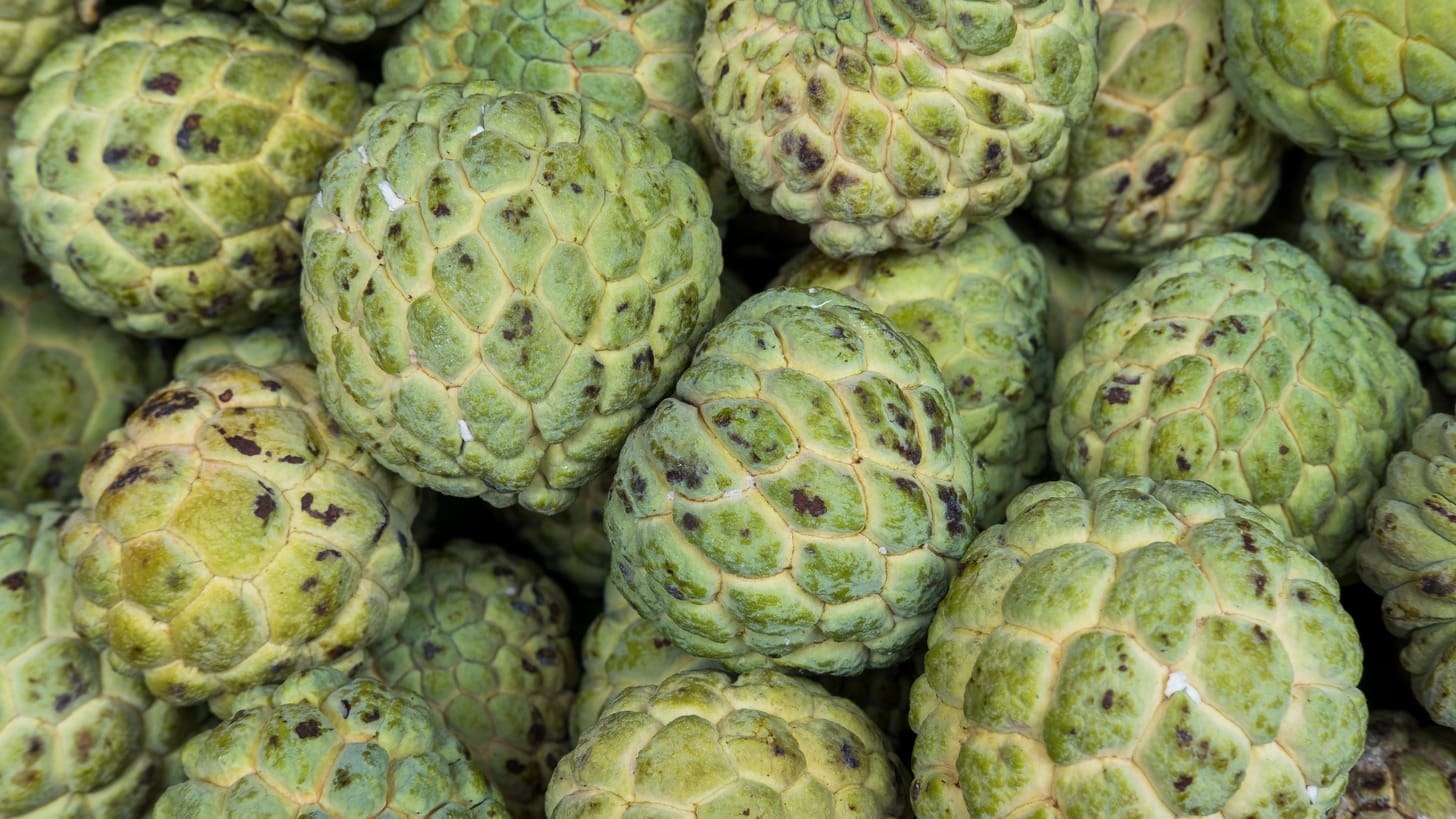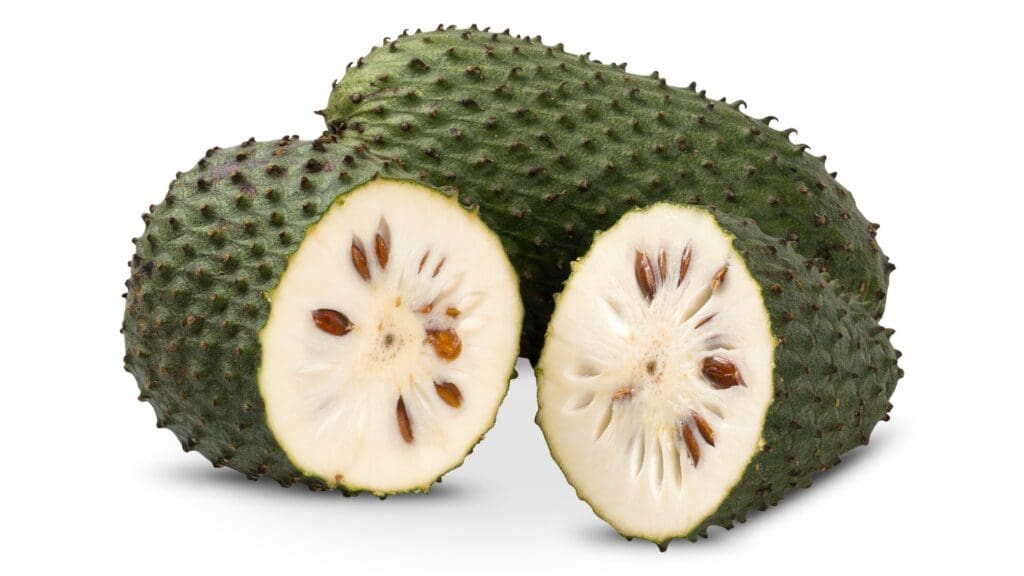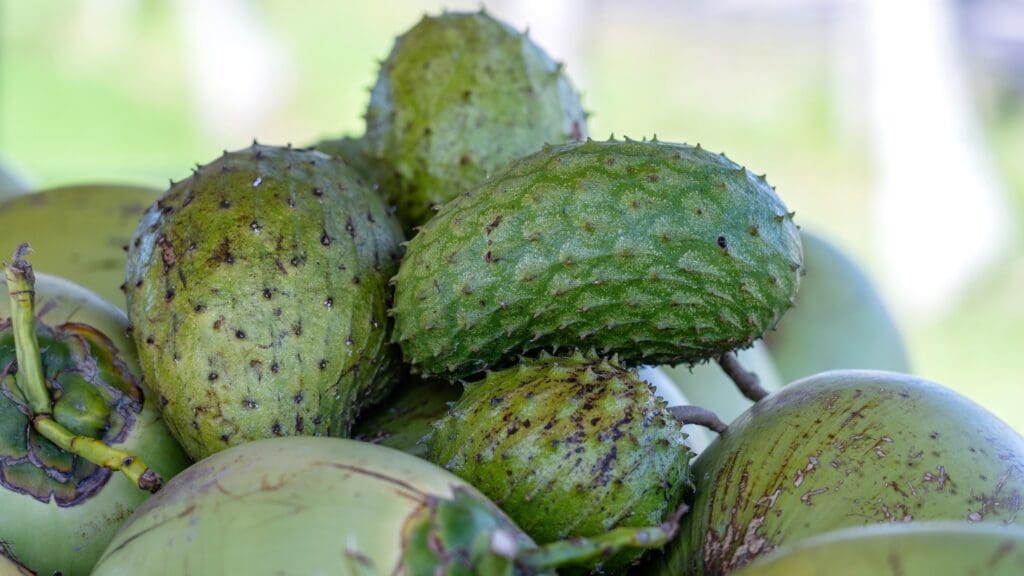Last Updated on November 26, 2025 by Bilal Hasdemir

We’re always looking for new ways to fight cancer. Soursop, or guanabana, is a fruit that’s caught a lot of attention. Soursop fruit cancer benefits have been studied a lot, showing it might help in cancer care.
Studies on graviola cancer treatments show soursop’s anti-cancer properties. We’re looking into does soursop fight cancer well. But, the research so far suggests soursop extracts could be very helpful for health.
At Liv Hospital, we’re dedicated to top-notch healthcare for international patients. We’re looking into soursop and its extracts for guanabana cancer cure research. We want to share what we find out.
Key Takeaways
- Soursop has been studied for its anti-cancer properties.
- The fruit’s extracts might help kill cancer cells and stop tumors from growing.
- More research is needed to understand soursop’s role in cancer treatment.
- Soursop is seen as a helpful addition to cancer care.
- Liv Hospital reviews the science to give you the full picture.
Understanding Soursop: Nature’s Possible Cancer Fighter
The soursop fruit, also known as guanabana or graviola, has been used for centuries in traditional medicine. It comes from the Caribbean and Central America. Recently, it has caught attention for its possible anti-cancer properties.
What is Soursop (Guanabana/Graviola)?
Soursop is a fruit-bearing tree in the Annonaceae family. Its scientific name is Annona muricata. It has a large, oval fruit with a soft interior and many seeds.
The leaves, bark, and roots of soursop are used in traditional remedies. They help with fever, pain, and respiratory issues.
The bioactive compounds in soursop, like acetogenins, are key to its medicinal properties. These compounds are found in the fruit, leaves, and seeds. This makes soursop tree parts valuable for health.
Traditional Uses in Medicine
Soursop has been used in folk medicine in many tropical areas. The leaves, fruit, and seeds treat various conditions. In some cultures, soursop tea is made from the leaves. It’s believed to have anti-inflammatory and anticancer effects.
Soursop is also used in traditional remedies. The leaves are crushed for skin conditions, and the fruit helps with internal ailments. Its versatility has made it popular in modern health discussions.
Research on soursop’s anti-cancer properties is ongoing. We’re learning how it might help with cancer treatments. Studies are looking into how soursop fights cancer cells.
The Science Behind Soursop’s Anti-Cancer Properties
Soursop might help fight cancer thanks to its special mix of chemicals. These are called acetogenins. Scientists have studied them a lot because they could be good for treating diseases.
Acetogenins: The Key Compounds
Acetogenins in soursop can stop cancer cells from growing. They do this by messing with how these cells make energy. Cancer cells need to make energy differently than healthy cells, so they’re more affected by these compounds.
Researchers have found acetogenins like annonacin and bullatacin in soursop. They’ve shown to be very good at fighting tumors. These compounds block the energy flow in cancer cells, stopping them from growing.
How These Compounds Target Cancer Cells
Acetogenins work by stopping the energy-making process in cells. Cancer cells need a lot of energy to grow fast. So, they’re more hurt by this stoppage. This way, acetogenins can kill cancer cells without harming normal ones.
Studies also look at how soursop might help with specific cancers, like prostate cancer. It seems soursop could help make other cancer treatments work better or have fewer side effects.
Even though the results are encouraging, more research is needed. But, the early findings suggest soursop could be a useful addition to cancer treatment plans.
Way 1: Inducing Apoptosis in Cancer Cells
Soursop might help fight cancer by making cancer cells die. This is a big area of research. Apoptosis, or programmed cell death, is key to getting rid of damaged cells.
Understanding Programmed Cell Death
Apoptosis is a complex process that leads to cancer cell death. It’s important for keeping tissues healthy and stopping cancer. But, in cancer, this process often goes wrong, causing cells to grow too much.
Research shows that natural compounds in soursop might help fix this. This could lead to new ways to treat cancer.
Research on Soursop’s Apoptotic Effects
Studies found that soursop extracts can make cancer cells die. Acetogenins, found in soursop, are key to this effect. They stop cells from making energy, which is needed to live.
Soursop extracts also change how cells signal to die. This includes turning on proteins that help cells die and turning off those that protect them. This can start the process of cell death.
Even though more research is needed, soursop might be a helpful addition to cancer treatment. It could make treatments like chemotherapy work better.
Way 2: Inhibiting Tumor Growth and Proliferation
Soursop shows promise in fighting cancer by stopping tumor growth. Studies in labs and on animals have shown positive results. This is important because tumors growing and spreading are key in cancer.
Laboratory Evidence
Lab tests have shown soursop extracts can slow down tumor growth. They also reduce cancer cell growth, making soursop a possible cancer fighter.
The compounds in soursop called acetogenins are key. They stop cancer cells from making energy, leading to cell death.
| Laboratory Study | Findings |
|---|---|
| Study on Soursop Extracts | Significant reduction in cancer cell proliferation |
| Analysis of Acetogenins | Inhibition of cancer cell energy production |
Animal Studies Supporting This Benefit
Animal studies back up lab findings, showing soursop extracts can stop tumors in animals. These studies help us understand how soursop could be used with other treatments against cancer.
Animal tests show soursop extracts can make tumors smaller and grow slower. This makes soursop a strong candidate as a cancer treatment helper.
Both lab and animal studies show soursop’s power in fighting tumors. As research goes on, we’ll learn more about using soursop in cancer treatment.
Way 3: Targeting Specific Cancer Types
Soursop is being studied for its ability to fight different cancers. We’ll look at its effects on breast, prostate, lung, and other cancers.
Breast Cancer Research
Studies suggest soursop extracts may help against breast cancer. They found compounds in soursop can slow down breast cancer cell growth and cause them to die.
A study published in a reputable journal showed soursop extract can greatly reduce breast cancer cell viability. This makes it a promising complementary therapy.
Prostate Cancer Studies
Soursop is also being studied for prostate cancer.
“The acetogenins in soursop are toxic to prostate cancer cells. This makes soursop a possible treatment for prostate cancer.”
More research is needed to understand how soursop affects prostate cancer.
Lung Cancer Research
Soursop may also help with lung cancer. Early studies indicate it can slow down lung cancer cell growth. More research is needed to confirm its full benefits.
Other Cancer Types (Pancreatic, Liver, Colorectal)
Soursop’s benefits extend beyond breast, prostate, and lung cancers. It’s also being studied for pancreatic, liver, and colorectal cancers.
| Cancer Type | Soursop’s Possible Effect |
|---|---|
| Pancreatic Cancer | Inhibiting tumor growth |
| Liver Cancer | Inducing apoptosis in cancer cells |
| Colorectal Cancer | Reducing cell proliferation |
Way 4: Powerful Antioxidant Activity
Soursop is rich in antioxidants, which are being studied for cancer prevention. Antioxidants fight free radicals, unstable molecules that harm cells. This harm can lead to cancer.
Free Radical Damage and Cancer
Free radicals damage cells, including DNA and proteins. This damage can cause mutations and disrupt cell function, leading to cancer. Soursop’s antioxidants help by neutralizing these harmful molecules.
Key antioxidants in soursop include flavonoids, phenolic acids, and ascorbic acid. These work together to boost the fruit’s antioxidant power.
How Soursop Neutralizes Oxidative Stress
Soursop’s antioxidants fight oxidative stress in several ways. They directly neutralize free radicals and also boost antioxidant enzymes in the body. This strengthens the body’s defense against oxidative stress.
By reducing oxidative stress, soursop may help prevent cancer cell growth. This makes it a promising area for cancer research.
Way 5: What Plant Kills Cancer Cells in the Body? Soursop’s Cytotoxic Effects
Soursop, a tropical fruit tree, is being studied for its ability to kill cancer cells. Known as Annona muricata, it has been used in traditional medicine for its anti-cancer properties. The fruit, leaves, and seeds of the plant contain compounds that show promise in fighting cancer.
Different Plant Parts and Their Efficacy
Research shows that different parts of the soursop plant can harm cancer cells. The fruit is often eaten and studied for its health benefits. But, the leaves and seeds are also being looked at for their anti-cancer properties.
Studies have found that soursop extracts contain acetogenins, which are known to fight cancer. These compounds can stop cancer cells from growing and cause them to die.
Comparing Fruit, Leaves, and Seeds
Research suggests that the leaves and seeds of soursop may have more anti-cancer compounds than the fruit. This could make them more effective in killing cancer cells. But, the fruit is also good for you and has some anti-cancer properties.
A study compared soursop leaf and seed extracts against cancer cells. Both were effective, but the leaves were found to be more potent. This suggests that the leaves could be a valuable source of anti-cancer compounds.
In conclusion, soursop’s different parts show promise in fighting cancer. More research is needed to understand their full benefits. By studying each part, we can unlock the anti-cancer properties of this remarkable plant.
Way 6: Reduction in Metastasis
Metastasis is when cancer spreads to other parts of the body. It’s a big challenge in cancer treatment. Recent studies show soursop might help.
Cancer metastasis is a complex process. It involves cancer cells invading tissues, entering the bloodstream, and spreading to new locations. This is why stopping metastasis is key in cancer treatment.
Understanding Cancer Spread
Cancer spread is not random. It follows a series of steps, each a target for treatment. The steps include local invasion, entering blood vessels, circulation, exiting blood vessels, and colonizing distant sites. Knowing these steps helps in finding ways to prevent or slow metastasis.
How Soursop May Help Prevent Metastasis
Research on soursop, like its acetogenins, shows promise in preventing metastasis. These compounds affect different stages of metastasis.
- Inhibition of cancer cell migration and invasion
- Reduction in the expression of metastasis-related genes
- Anti-angiogenic effects, preventing the formation of new blood vessels that feed tumors
- Induction of apoptosis in metastatic cancer cells
A study in the Journal of Medicinal Food found soursop extract stops cancer cell migration and invasion. This suggests it could be an anti-metastatic agent. Another study on soursop’s acetogenins found they can stop cancer cell growth and cause apoptosis.
| Study | Findings | Potential Benefit |
|---|---|---|
| Journal of Medicinal Food | Soursop extract inhibited cancer cell migration and invasion | Potential anti-metastatic effects |
| Research on Acetogenins | Inhibition of cancer cell growth and induction of apoptosis | Potential to reduce tumor growth and metastasis |
These findings are encouraging, but more research is needed. Most studies on soursop and metastasis were done in labs or on animals. Human clinical trials are necessary to fully understand its effects.
Way 7: Complementary Use with Conventional Treatments
Soursop has many benefits in cancer treatment, including as a complementary therapy. Using soursop with standard treatments might improve patient outcomes. It offers a holistic approach to cancer care.
Soursop and Chemotherapy
Research shows soursop can work well with chemotherapy. It has compounds that may boost chemotherapy’s effectiveness. For example, soursop’s acetogenins target and kill cancer cells, helping chemotherapy do its job better.
Key findings include:
- Enhanced cancer cell death when soursop extracts are used with chemotherapy agents
- Potential reduction in chemotherapy side effects due to soursop’s antioxidant properties
- Increased sensitivity of cancer cells to chemotherapy when pre-treated with soursop extracts
Potential Synergistic Effects
Using soursop with conventional treatments can lead to better results. This combination might offer a stronger effect than either treatment alone. It could improve treatment outcomes and patient quality of life.
Some possible synergistic effects include:
- Improved tumor reduction rates
- Enhanced immune system support
- Better management of treatment side effects
While the benefits are promising, more research is needed. Patients should talk to their doctors before adding soursop or any supplement to their treatment plan.
Consumption Methods and Preparations
Soursop is versatile and can be enjoyed in many ways. We’ll look at how to make soursop tea, eat the fruit, and use supplements and extracts.
Soursop and Guanabana Tea Preparation
Soursop tea, also known as guanabana tea, is easy to make and might be good for you. You can use the leaves or the fruit of the soursop tree to make it.
- For soursop leaf tea, boil 1-2 cups of water and add 1-2 soursop leaves. Let it steep for 5-10 minutes.
- For soursop fruit tea, boil the fruit in water for 10-15 minutes, then strain and serve.
Research shows soursop tea might fight cancer cells. Drinking guanabana tea cancer patients might find it helpful as part of their treatment.
Fruit Consumption Guidelines
Eating soursop fruit is a great way to get its nutrients. It’s important to follow some guidelines to get the most out of it.
| Preparation Method | Benefits | Precautions |
|---|---|---|
| Eating fresh | High nutritional value | Ensure the fruit is ripe and clean |
| Juicing | Easier to consume large amounts | Be cautious of sugar content |
| Freezing | Long-term preservation | May lose some nutritional value |
Supplements and Extracts
If you can’t eat soursop naturally, supplements and extracts are good alternatives. Soursop supplements come in capsules, powders, and liquid extracts.
When picking soursop tea for cancer or supplements, choose reputable brands. Always talk to a doctor before trying new supplements.
Studies suggest soursop extracts might help in cancer treatment. But, we need more research to know for sure.
Conclusion: The Promise and Limitations of Soursop for Cancer
We’ve looked into how soursop, also known as graviola, might help fight cancer. Studies suggest it could kill cancer cells, stop tumors from growing, and target certain cancers. Its ability to fight off harmful cells and protect against damage might also help in cancer treatment.
Even though early studies are encouraging, we need more research. Human trials are key to understanding how soursop can help with cancer. It’s important to see soursop as a supplement, not a cure-all for cancer.
More studies are needed to figure out the best ways to use soursop for cancer. We also need to watch out for any dangers or side effects. By studying soursop further, we can find out how it can best help in the fight against cancer.
FAQ
What is soursop, and how is it related to cancer treatment?
Soursop, also known as guanabana or graviola, is a tropical fruit used in medicine. It has shown promise in fighting cancer. Studies suggest it can kill cancer cells and slow tumor growth.
How does soursop fight cancer?
Soursop contains compounds called acetogenins. These target cancer cells and cause them to die. It also has antioxidants that fight free radicals and reduce stress, which may lower cancer risk.
Can soursop cure cancer?
Soursop has shown promise in cancer research. But, it’s not proven to cure cancer yet. More studies are needed to understand its benefits and limits.
What types of cancer may soursop help fight?
Research has looked at soursop’s effects on many cancers. This includes breast, prostate, lung, pancreatic, liver, and colorectal cancers.
How can I consume soursop for its anti-cancer benefits?
You can enjoy soursop as tea, fresh fruit, or supplements. But, make sure to follow proper preparation and talk to a healthcare professional first.
Can soursop be used in conjunction with conventional cancer treatments?
Some studies suggest soursop can help with conventional treatments like chemotherapy. It might make treatments more effective. But, more research is needed to confirm this.
Are there any side effects or interactions with soursop?
Soursop is generally safe but can interact with some medications. It may also have adverse effects in large doses. Always consult a healthcare professional before using it, even if you’re healthy.
Does soursop have any benefits for diabetes?
Some research suggests graviola, another name for soursop, may help with diabetes. But, more studies are needed to confirm its effects.
What part of the soursop plant is most effective against cancer?
Studies have looked at different parts of the soursop plant. The leaves and seeds might be more effective because they have more acetogenins.
References
- Medical News Today. Soursop: Potential Benefits and Risks. https://www.medicalnewstoday.com/articles/soursop
- PubMed Central (PMC). Article PMC5888937. https://pmc.ncbi.nlm.nih.gov/articles/PMC5888937/








